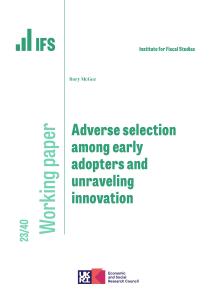Soda taxes aim to reduce excessive sugar consumption. Their effectiveness depends on whether they target individuals for whom the harm of consumption is largest. We estimate demand and account for supply-side equilibrium pass-through. We exploit longitudinal data to estimate individual preferences, which allows exible heterogeneity that we relate to a wide array of individual characteristics. We show that soda taxes are effective at targeting young consumers but not individuals with high total dietary sugar; they impose the highest monetary cost on poorer individuals, but are unlikely to be strongly regressive if we account for averted future costs from over consumption.
Revised January 2019
Authors

CPP Co-Director, IFS Research Director
Rachel is Research Director and Professor at the University of Manchester. She was made a Dame for services to economic policy and education in 2021.

Research Fellow Toulouse School of Economics
Pierre is a Research Fellow at the IFS, a Professor of Economics at the Toulouse School of Economics and a co-editor of the JEEA.

Research Fellow University of Wisconsin
Martin, previously Deputy Research Director, is a Research Fellow at IFS and Professor of Economics at the University of Wisconsin.
Working Paper details
- Publisher
- CEPR
Suggested citation
P, Dubois and R, Griffith and M, O'Connell. (2017). How well targeted are soda taxes?. Toulouse: CEPR. Available at: https://ifs.org.uk/publications/how-well-targeted-are-soda-taxes-0 (accessed: 2 May 2024).
Grant
Related documents
More from IFS
Understand this issue

Spring Budget 2024: What you need to know
7 March 2024

Spring Budget 2024: the Chancellor’s options

The £600 billion problem awaiting the next government
25 April 2024
Policy analysis

Spring Budget 2024
6 March 2024

Reforming the taxation of non-doms: policy options and uncertainties
4 March 2024

Oil and gas make Scotland’s underlying public finances particularly volatile and uncertain
27 March 2024
Academic research

Saving by buying ahead: stockpiling in response to lump-sum payments
2 February 2024

Intertemporal income shifting and the taxation of business owner-managers
24 January 2024

Adverse selection among early adopters and unraveling innovation
18 December 2023